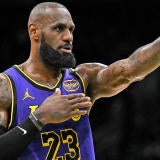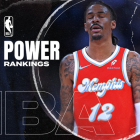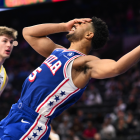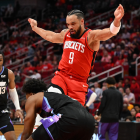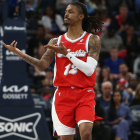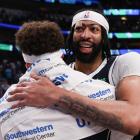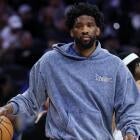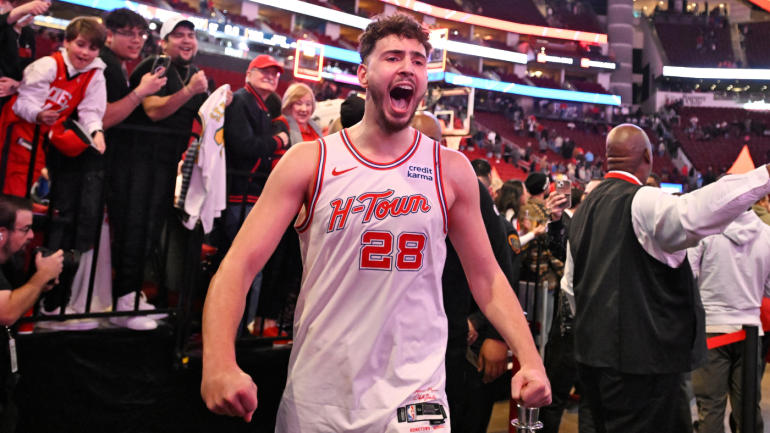
Alperen Sengun didn't like the way he played in the first half of an early January game against the Chicago Bulls. In his words, the third-year center said he was playing "soft," something Houston Rockets coach Ime Udoka similarly alluded to after the game. Sengun was held to zero points in the first half of that Jan. 10 game in Chicago, the first time that's happened all season. He had five rebounds, three assists and a steal through the first 24 minutes of action, but was 0 for 5 from the floor, as well as 0 for 2 from the free-throw line, and the Rockets found themselves down 62-54 at halftime.
After that dud of a first half, however, Sengun proceeded to score 20 points in the second half, and helped push the game to overtime after being down by as many as 16 points. Once overtime started, the big man scored or assisted on all of Houston's points. And while it wasn't quite enough to get the win, Sengun's takeover in the second half and overtime perfectly encapsulated the rise he's been on this season.
Sengun is averaging career highs across the board, is getting the most touches of his career and has become the Rockets' No. 1 option on offense. He's playing at a level that's earning him All-Star consideration, finishing sixth in the final round of fan votes for the Western Conference frontcourt, ahead of established All-Stars like Paul George and Domantas Sabonis. It's been a whirlwind of a season for the Turkish big man, part of which he credits to a "really hard summer" to prepare for what's become a breakout year for him.
"I worked really hard this summer, more than any summer," Sengun told CBS Sports. "Like [working on getting] more physical, my shooting, everything. It was a really hard summer for me."
Sengun's approach to the offseason was different compared to the one after his rookie season. Instead of spending most of his summer training with the Turkish national team, Sengun prioritized individual workouts first before joining his countrymen for a slate of Olympic pre-qualifying games in August 2023. But that wasn't the only change that occurred over the offseason that's led to Sengun's rapid development.
Shortly after the Rockets' 2022-23 season came to an end, the team decided to part ways with coach Stephen Silas, who through three seasons at the helm posted a 59-177 record. The Rockets brought in Udoka as their next head coach, a sign that this team wanted to develop quickly. Udoka's hard-nosed coaching style is something Sengun welcomed, as he's had experience with tough coaches in Turkey.
"He's helped me a lot because he's a tough coach, and I came from Europe where every coach is like that," Sengun said. "Where I grew up, it was always tough for me. Ime's tough, but he likes teaching you. Like if you're playing bad he's like trying to wake you up, you know, and that's how I learned in Europe. You come here and you don't see that in the NBA that much. There's not many coaches like Ime, but Ime is like how I want to be coached."
Udoka will praise Sengun, but he's quick to call him out on his shortcomings, too. That's why after the Rockets' overtime loss to the Bulls in which Sengun was the reason Houston managed to push it to overtime, Udoka first focused on his poor showing in the first half.
"He played one half of basketball basically, decided to show up at halftime, exerted himself the way he normally does," Udoka said after that game. "Saw the player that he is [in the second half] more so than what he is not in the first half with zero points, and so for whatever reason it took him a little time to get going. Took time searching for fouls instead of going to score, and I think we got much more certainty [from him]."
When Udoka was brought in as the head coach last April, his goal was to get Sengun to break some of what he calls "lazy habits" he's learned over the years. Fred VanVleet also had the same mission when he signed with the team this past summer.
"I knew the skill was there, knew the talent was there, I was just kind of studying his habits and seeing his approach, and seeing how I could help him in certain areas," VanVleet told CBS Sports. "All of the guys, but especially him, kind of didn't have like a process of how they want to get to the thing they want to get to."
The addition of veterans like VanVleet, Dillon Brooks and Jeff Green during the offseason showed that Houston was not only tired of losing, but also wanted to create a culture that would better serve their young players like Sengun, Jalen Green, Jabari Smith and Amen Thompson. Sengun's chemistry with VanVleet specifically has been part of the reason why he and the Rockets have improved from a year ago.
"Fred is not like, I mean, he's short, you know, he needs to use his brain like I have to," Sengun said. "I'm not an athletic guy like a lot of NBA players, so I need to use my brain too. It's like same mind, two players. ...He's always teaching me and telling me what I have to do."
VanVleet dishes out 22.9 passes a night to Sengun, the highest total of passes from VanVleet to anyone else on the team by a wide margin (the next closest is Green at 11.9 passes per game). Of VanVleet's 8.5 assists per game -- a career high for the champion guard -- 40% of those assists (3.4 assists per game) are going to Sengun. Their chemistry has felt instantaneous, and when the duo is on the floor together Houston's offense scores nearly four points more than when they're both sitting.
It also helps that Sengun possesses a skillset that is really only shared with one other player in the league: Nikola Jokic. Sengun's heard the comparisons going back to when he was 17 years old, when a Serbian coach he was working with at the time -- who also worked with Jokic -- told him they had similar playing styles. And when you watch Sengun, you'll see why. He can get you 20, 25 points easily when needed, but his court vision and passing make him truly unique for someone of his size.
He may not be on the same level as Jokic -- though his stats right now are better than what the Serbian big man put up in his third year -- but his offensive skillset is why VanVleet has called him a superstar in the making.
"He's unguardable really, I mean, you can't guard him one on one," VanVleet said. "That's the first step, so now he's going through the second step which is making the defense pay for sending help. And the better we are as a team, the better he'll play."
Sengun displayed that "unguardable" nature in back-to-back performances recently. The first was when he posted a career-high 37 points, 14 rebounds and six assists on 57.7% from the field in an overtime win against the Utah Jazz. The second was a triple-double (24 points, 12 rebounds, 10 assists) in a loss to the Celtics. In both games Sengun showed why Udoka says he's one of the best post scorers in the league. Sure, he'll use his strength to back you down like an old-school big, but where he's really dangerous is when he catches the ball on the move. He may not be as athletic as other guys in the league who are like freight trains when they get downhill, but his strength and finesse around the rim make him impossible to nail down, even with a bigger defender like Kristaps Porzingis on him:
And what really puts Sengun in that category of unicorn is his ability to do stuff that's typically reserved for guards. Like running a pick-and-roll where he's the ball handler. It's not every day you're going to see the 6'0 VanVleet setting a screen on a 7'0 Walker Kessler, just for Sengun to put Kris Dunn in the spin cycle, stop on a dime to catch Kessler with the pump fake and lay it in.
Even when he's met with defensive pressure in the post to keep him from scoring, Sengun is just going to pull off some crafty, out-of-this-world pass that you never even saw coming. That's exactly what he did when he drove to the rim out of a pick-and-roll with VanVleet, and when he was met with a brick wall of defenders in the name of Giannis Antetokounmpo and Brook Lopez. Sengun just dumped off a no-look bounce pass to the corner where Smith Jr. was wide open to nail the 3-pointer.
Passes like that are what Sengun says he could never do in Europe. "If you get a turnover that's going to like, f--- you up," Sengun said. But in Houston coaches and teammates encourage him to explore the creative side of his skillset. But the truly remarkable thing about how Sengun plays is that, for being just 21 years old, he doesn't ever look frazzled or rushed. Udoka's said before that Sengun brings a calming presence on offense, something that despite his age he isn't entirely surprised by.
"He's a smart guy for his age," Udoka said. "You see some of the things and the numbers he's putting up at that age, some of the guys that are, you know -- you look at Jokic, you look at other guys, they were quite a bit older when they did that. So to that extent, I say a little bit [surprised]. But he plays at his pace, he's a smart guy, he has vision, can pass and score, and so the balance works really well for him."
Sengun's operating at a level this season that very few players have ever reached. In NBA history there have only been 10 other players who have averaged at least 20 points, nine rebounds and five assists while shooting over 50% from the field. Aside from Sengun, only one other player on that list (Sabonis) has not been named league MVP. It's a list littered with last names that get mentioned in conversations about who the greatest big men are: Jokic, Antetokounmpo, Abdul-Jabbar, Chamberlain, Barkley, Garnett and Embiid. The others are also all-time greats with Larry Bird and Oscar Robertson rounding out the list. But Sengun is the only one in that exclusive club to do it age 21 or younger.
You could say that Sengun's taken that "third-year leap" that so often gets mentioned in NBA circles when talking about the natural development of a young player. But to say that feels like a massive understatement. He's blown past every reasonable checkmark for someone of his age, and it feels like he's on a trajectory that's going to force the Rockets to get serious about building a contender around him sooner than expected.
![[object Object] Logo](https://sportshub.cbsistatic.com/i/2020/04/22/e9ceb731-8b3f-4c60-98fe-090ab66a2997/screen-shot-2020-04-22-at-11-04-56-am.png)








